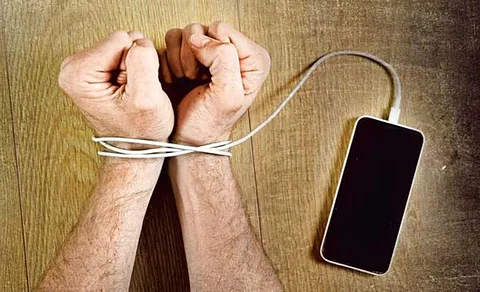

Visualise this: You want to read a book but as soon as you open the first page, you have an itch to check your phone for new messages. Once you do, you start scrolling and before you know it, an hour has passed by. Raise your hand if you want to check just that one recipe before you go to bed and end up spending hours doom-scrolling at the cost of your sleep and your next day’s routine.
Yes, all of us have been guilty of these practices as the screen has become an indispensable part of our lives – be it for professional or personal reasons. Experts, however, believe that if we set our minds to it and can take a break from it mindfully, it could do wonders for our mental and physical health. This is where digital detox, a buzzword in recent times, enters the picture. While the concept sounds pleasing, the act of bidding adieu to our gadgets, especially smartphones suddenly, may cause more duress and withdrawal than one can imagine. Lounge speaks to people on how to practice digital detox sustainably and practically.
When she got tired of watching reels in her free time, Maria George, a Mumbai-based baker who runs the brand, Plattered, decided to go off social media. “The two-minute break would often turn into a 20-minute-one and I wasn’t able to focus on anything. Social media was not helping me in any way and I didn’t want to see other people’s lives anymore as it just didn’t matter,” she said. Terming the mobile as the “idiot box” of today, she says that getting off social media has given her a lot of time to pursue other interests of hers such as writing or block printing.
“Earlier, I would reach for the phone as soon as I woke up, but now, I can focus better on my brand as well as my hobbies. Of course, we can’t completely switch off work. So, I use Whatsapp for communication, and if I need to use social media, I use it on the browser,” she notes.
For BV Dattatri, chairman of Kala Sourabha Foundation, a Bengaluru-based fine arts training academy, detoxing digitally started a year ago as an experiment. It soon became a way of life. Mr Dattatri, also a classical vocalist trainer and performer, takes a break from the screen every Wednesday. “A friend of mine used to practice digital detox every Thursday and while initially, it was very difficult for everyone to stay in touch with him, his friends and family gradually changed and learnt not to disturb him on Thursdays,” he says while talking about what set him off on the detox mode. The same happened with Dattatri once he implemented the ‘No screen on Wednesday’ rule.
“As I started practising it regularly, my family and friends knew not to disturb me on Wednesdays. I had plenty of time to focus on every task that I did. If I had any extra work, I would keep it for a Wednesday as I felt like I had 24 hours all to myself.” Here, Dattatri clarifies that digital detox is not ‘zero phone usage’ but ‘zero internet usage’. “Almost 75% of the time that we spend online is a waste. But if we use technology for minimum requirements such as making calls or conducting meetings, we’ll be more productive and happier too,” he sys.
According to health experts, reducing screen time is challenging yet doable. Sajeev Nair of Vieroots Wellness Solutions, a Bengaluru-based health tech start-up says, “With 24X7 social media, Netflix and breaking news, a digital detox is tough but not impossible. The primary solution is to realise that endless scrolling is an addiction as it is driven by dopamine.” The risk here is higher, however, says Mr Nair, as digital addiction is not considered a taboo. It can go deeper, which makes it difficult to quit.” Mr Nair, who is also a longevity researcher and biohacker, believes that the brain is an evidence-seeking machine and hence, can overcome anything including staying away from the screen.
1. Start small. Set a fixed time for yourself minus your phone. It could be an hour in a day or a day in a week.
2. Practice meditation and journalling. These activities not only keep you away from the screen but also help you be mindful of your digital practices.
3. Plan activities in advance for the screen-free time. It could be trekking, swimming, yoga, reading, gardening, baking, or anything else you like.
4. Switch to browser mode. Accessing social media from your browser does help you slow down, Maria George says. “The suggestions are fewer and you need at least two extra clicks to get to where you want. Since it’s slower and more annoying, you end up not using social media.”
5. Reward yourself. Whether it’s enjoying an interesting series or digging into a sumptuous meal at your favourite restaurant, pamper yourself when you meet your goals.
(By arrangement with livemint.com)